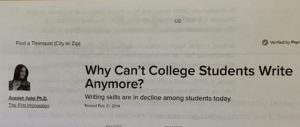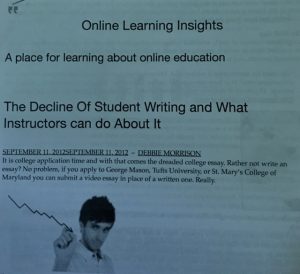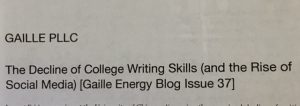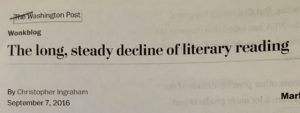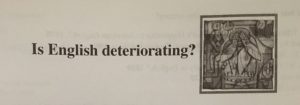I recently played mah jong with other women of a certain age who were lamenting the quality of writing today, especially among their grandchildren. The opinion at the table was unanimous. But upon reflection (even after I noticed the poor writing in some recent novels I read), I wondered whether that is true. I searched online and here are the first several articles I found.
According to Goldstein, “Three-quarters of both 12th and 8th grades lack proficiency in writing… And 40% of those who took the ACT writing exam in the high school class of 2016 lacked the reading and writing skills necessary to complete successfully a college-level composition class…”
Goldstein says that the root of the problem is that teachers have little training in how to teach writing and are often weak or unconfident writers themselves. According to a 2016 study of teachers across the country in grades three through eight, fewer than half had a college class that devoted significant time to the teaching of writing and fewer than a third had taken a class solely devoted to how children learn to write. The article then goes on to discuss various approaches to teaching writing.
In spite of the shortage of high-quality research on the teaching of writing, Goldstein cites a few concrete strategies that help.
- Children need to learn how to transcribe both by hand and through typing on a computer.
- Children need to practice writing great sentences before writing paragraphs.
- They need clear feedback on their writing.
- Students need a synthesis of freewriting without a focus on transcription or punctuation AND grammar instruction.
Aalai says she has seen a decline in writing ability even over the last ten years, declines in critical thinking, proper syntax, spelling, grammar, even proper structure like paragraph indentation and how to cite sources. And she asks, “In the digital world where language is reduced down to 120 characters or less, is some essential part of ourselves that needs to be cultivated… also being lost in the shuffle?”
Morrison’s blog post is very thorough. She presents facts on the writing skill gap, as well as “interesting data from The Writing Lives of College Students,” a list of strategies instructors might consider to develop students’ writing skills. “What is surprising is that students view sending text messages as a writing form and consider it to be the most valuable form of writing over all others.” There are also several enlightening responses to her blog.
Gaille’s blog offers the following reasons for the decline in writing skills.
- Social Media Displacement of Reading. The basic issue is that students engage in social media rather than serious reading as a leisure activity.
- Digital Brains. Cites cognitive neuroscientists’ conclusions that touching, pushing, linking, scrolling and jumping through text accounts for students’ difficulties with reading the classics.
- College is Less Rigorous. (He cites research.)
- Writing Skills Are No Longer Graded. I.e., “[c]ontent alone matters, not how well the student expressed it.”
- Text Slang. This includes shortcuts, alternative words, or symbols to convey thoughts in an electronic document.
Ingraham cites data to the effect that in 2015 the percentage of American adults who read literature (novels, short stories, poetry, or plays) fell to at least a three-decade low. The data exclude reading for school or work, so I’d classify this as reading literature for pleasure. Only 43% read at least one work of literature in the previous year, compared to 57% in 1982.
Who reads?
- 50% of women, 36% of men
- 50% of whites, 29% of African-Americans, 27% of Hispanics
- 68% of people with a graduate degree, 59% with a bachelor’s degree, 30% with a high school education
Across the board, there have been drops in literary reading among all ages, races, and educational levels.
Does it matter if people are reading fewer works of literature? Yes! “A number of recent studies have demonstrated that fiction—particularly literary fiction—seems to boost the quality of empathy in the people who read it, their ability to see the world from another person’s eyes.” And the world needs more empathy than ever!
This post starts with six quotes about the deterioration of language, then goes on to note that these quotes come from 1785 through 1978! According to Harvey A. Daniels, Famous Last Words: The American Language Crisis Reconsidered, “The earliest language ‘crisis’… that I have been able to discover occurred in ancient Sumeria… It seems that among the first of the clay tablets discovered and deciphered by modern scholars was one which recorded the agonized complaints of a Sumerian teacher about the sudden drop-off in students’ writing ability.”
According to this article, Daniels concludes the following:
- our language cannot “die” as long as people speak it
- language change is a healthy and inevitable process
- all human languages are rule governed, ordered, and logical
- variations between different groups of speakers are normal and predictable
- all speakers employ a variety of speech forms and styles in response to changing social settings
- most of our attitudes about language are based upon social rather than linguistic judgment
To paraphrase Gaille’s last paragraph: Just as good writing withstood the distractions of dance crazes, automobiling, and magazines, it also will survive social media.


